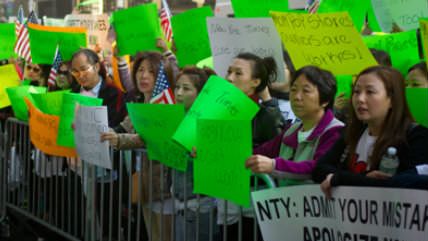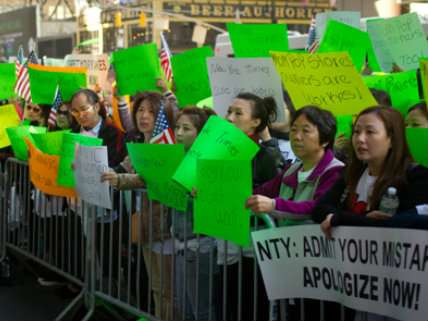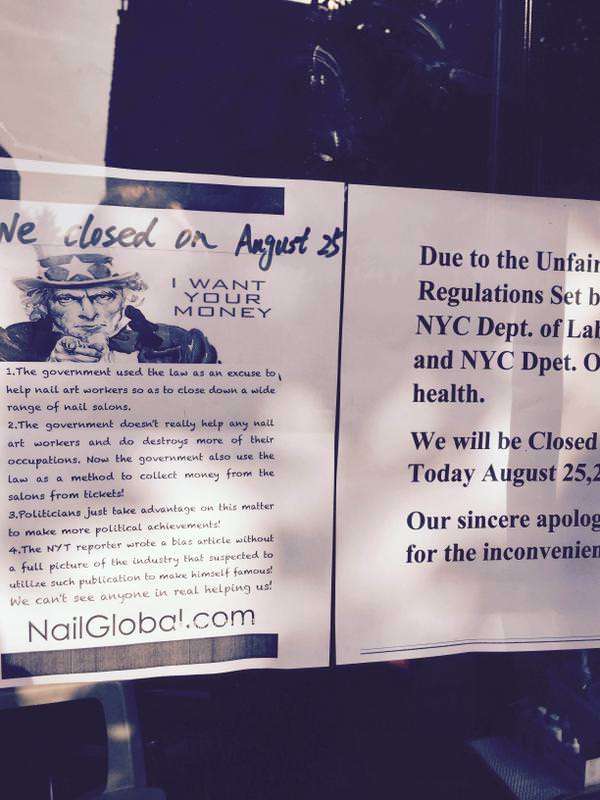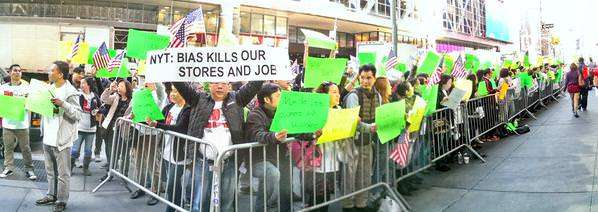Asian Nail Salon Staff Demand Apology From The New York Times for Poverty-Porn Series That's Costing Them Jobs
Liberals love laborers in theory but seem to love their sense of moral superiority more.


On Tuesday morning, New York City nail salon owners and employees mobbed The New York Times' office in protest of the paper's coverage of their industry. "We've all come together because of the New York Times' misleading article," one protester told Jezebel's Helen Holmes. "I couldn't say discrimination, but the New York Times is not doing the fair thing for our community." The article in question (actually a two-part series, called "Unvarnished") was published by the Times in May. Reporter Sarah Maslin Nir said she wanted to highlight the pervasive worker exploitation she believed took place in the city's Asian nail salons.
Response to Nir's "expose" was swift and emotional, with fashion-bloggers crowing about how they would rethink their weekly mani-pedis and New York Gov. Andrew Cuomo ushering through a package of "emergency protections" for salon staff. The state also launched a Nail Salon Enforcement Task Force which, by mid-July, had issued 1,799 new citations to nail salons. Officials heralded this as a step toward stamping out salon-worker exploitation, while activists and Twitter bleeding-hearts took it as proof that Nir's prognoses was right: these salon owners were out of control, and needed the government to put them in their place.
New York authorities had been on a crusade since at least year to regulate nail salons more tightly. It seems Nir's article provided the impetus and public support enabling the city to do just that.
But you know who hasn't been so psyched about the new worker "protections?" The people who actually work at nail salons. Because of citations and new regulations, some salons have been forced to close, costing the women who worked there their jobs. Because of rules mandating extra pay for overtime work, manicurists saw hours cut back. "I know the article tried to help us," an Upper East Side salon employee told the Times in July. "But for some employees it created a worse situation."

In August, nail salons across New York City closed for several days in protest. Signs posted on their shuttered doors mentioned the city's "unfair regulations," suggesting that worker protection was merely a convenient excuse for a government looking to wrest fine-money small businesses.
In September, several hundred salon staffers and owners rallied at Manhattan's City Hall against a requirement that all salons purchase a wage bond by Oct. 6, 2015 or face significant fines and possible shutdown. The Korean-American Nail Salon Association and the Chinese Nail Salon Association also filed a lawsuit in New York's high court seeking to overturn the wage-bond requirement. A wage bond serves as a sort of insurance if a business is found to have stiffed workers on pay, but for the vast majority of nail salons that aren't exploitative, it's simply an extra annual cost—no small deal for small businesses with small profit margins.
The wage bond was also a target of last Tuesday's protest, where many of those gathered wore shirts saying, "No Wage Bond. Stop Squeezing Small Business!" Other signs at the protest were emblazoned with messages such as "New York Times Please Don't Lie!" and "Apology Now! Fire Nir!" What's more, "wage bonds are not readily available in the marketplace," according to the nail-salon lobby's lawsuit. The state has "imposed these wage-bond requirements despite countless pleas from nail-salon owners to lift or delay the requirements until wage bonds are readily available to them in the marketplace, as required by law." They also claim "there is ample evidence that (the state is) selectively enforcing wage bonds requirements against Asian-American nail salon owners."

Reason's Jim Epstein was at Tuesday's protest, and he has been re-interviewing many of the folks mentioned in Nir's story. All I'll say for now is that … his discoveries have been interesting (stay tuned next week!). But while Epstein's upcoming work goes above and beyond other rebuttals of the Times' "Unvarnished" series, he won't be the first to question the accuracy of Nir's reporting and storytelling. In July Richard Bernstein, a former Times staffer who owns two New York City spas with his Chinese wife, challenged several central claims in Nir's work, including her assertion that pay as low as $10 per day was common in the city's Asian nail salons.
Epstein and I have both been covering this nail-salon saga at Reason, and were among the first to criticize Nir's article and its conclusions. At the time, I received a lot of snarky, impassioned social-media messages and blog mentions from people condemning libertarians' alleged disregard for workers and poor people and immigrants—nevermind that my central critique all along has been that actually, the "protections" Nir and her allies wanted would make marginalized and immigrant laborers worse off. Rather than be right, I'd much prefer to see these people's struggles eased, so it's bittersweet being vindicated here.
If there's a silver lining… well, I'd like to think that the massive outcry from salon staff against their self-appointed saviors may actually change minds a little on the liberal side—make them rethink whether excessive regulation is always the best way to end alleged exploitation, and whether lurid advocacy journalism is the best basis for public policy. Perhaps even consider that maybe, just maybe, libertarians oppose this shit not out of some childishly rebellious attitude or yearning for the robber-baron days but precisely because it hurts those in precarious positions the most. But I won't hold my breath. For a lot of people, it's much easier to see the world as a black-and-white struggle between vulnerable workers and exploitative bosses, between honorable pro-regulatory types who care for the poor and their greedy, small-government foes. It's much easier not to think too hard about these things.
When asked about her biggest takeaway from writing the "Unvarnished" series, Nir said: "The only way that you can have something decadent for a cheap price is by someone being exploited." I think Nir's statement might be right in this case, just not in the way that she intended it. I'm reminded of all the online outrage- and sympathy-mongering in the wake of the articles' publication, all the pearl-clutching about these poor othered Asian ladies, the indignant responses to anyone with objections, the unalloyed praise when Cuomo passed his new laws. Moral righteousness is pretty decadent, especially when it comes as cheaply as reading a free newspaper article and sending off a few meticulously earnest tweets. All it costs is more exploitation of the same people this moral majority pretends to care about.


Show Comments (155)